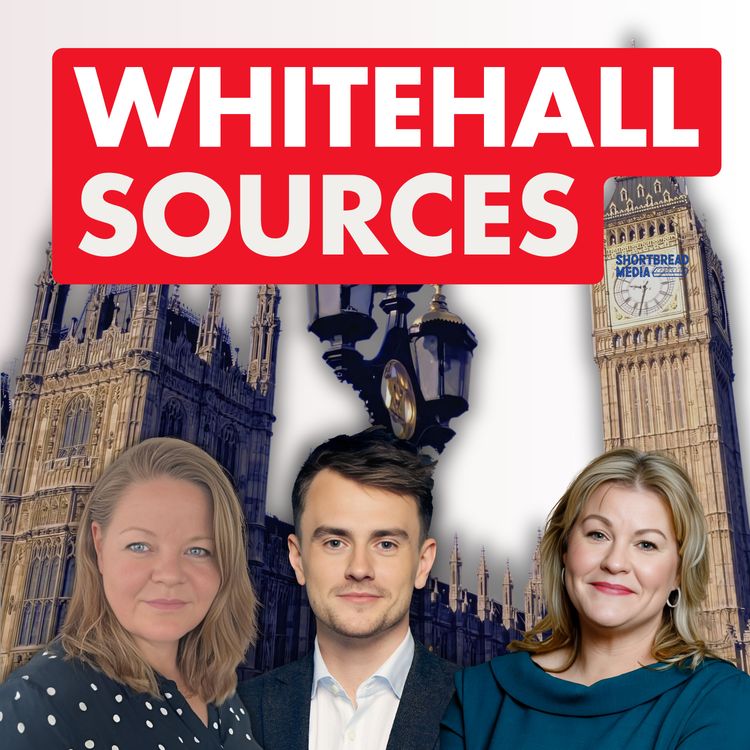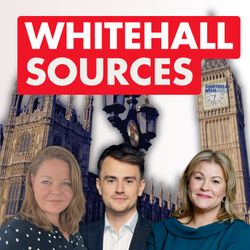Share

Whitehall Sources
Westminster Gossip, The Bute House Agreement and Rail
Season 3, Ep. 14
•
Kirsty's got fresh gossip from all of her swanky Westminster events about the timing of an election; Calum explains why Humza Yousaf might not be First Minister of Scotland for much longer; and will Labour be the Government to finally improve rail services?
More episodes
View all episodes

1. Robert Jenrick Defects to Reform UK: Kemi Badenoch’s Power Play & the Future of the Right
37:14||Season 5, Ep. 1Robert Jenrick’s dramatic defection from the Conservative Party to Reform UK has sent shockwaves through Westminster – and raised serious questions about the future of the British right.On this episode of Whitehall Sources, Calum Macdonald and political strategist Jo Tanner are joined by former Conservative minister Paul Scully to unpack how Kemi Badenoch moved first, sacking Jenrick before Nigel Farage could stage a political ambush.Was this a show of strength from the Conservative leader – or a sign of deeper fracture on the right? What does Jenrick really bring to Reform UK beyond short-form viral politics? And does Farage’s growing band of defectors make Reform more credible – or harder to control?The panel also explores:Whether Badenoch is finally growing into the role of Opposition LeaderWhy grassroots Conservatives feel betrayedThe collapse of any realistic Tory–Reform pactReform UK’s vulnerability on democracy and by-electionsClaims that a “high-profile Labour figure” could defect nextAnd whether Farage is once again dominating the political agenda while Labour struggles for airtimeThis is an inside-Westminster conversation about power, ego, loyalty, and the reshaping of British politics.🎧 Subscribe for weekly insight from inside Westminster.
46. UK Elections 2026 Preview: Reform UK, Labour, SNP & Plaid Cymru
01:08:21||Season 4, Ep. 46The Sources Podcast hosts come together for a special New Year 2026 UK politics preview, analysing what could be the most volatile year in British politics for a generation.With local elections in England, Scottish Parliament elections, Senedd elections in Wales, and mounting pressure on the Northern Ireland Executive, this episode explores how the rise of Reform UK, growing voter fragmentation, and Labour’s governing challenges could reshape the UK’s political map.🎙️ Featuring voices from:Whitehall SourcesHolyrood SourcesStormont SourcesSenedd Sources🔍 In this episode:Is Reform UK becoming a permanent force in British politics?Can Keir Starmer’s Labour government survive a brutal May election?Why the Greens and Gaza independents are threatening Labour in citiesWill SNP dominance in Scotland finally crack — and if so, who replaces them?Could Plaid Cymru lead Wales for the first time?How stable is Stormont, and could it collapse again before 2027?What a fragmented UK means for the future of the UnionThis is essential listening for anyone trying to understand UK elections 2026, Nigel Farage’s influence, Labour’s political future, and the growing instability across Britain’s devolved governments.📌 Subscribe for weekly insider analysis from Westminster, Holyrood, Stormont and the Senedd.--Whitehall Sources is a podcast which takes you behind the door of Number 10 Downing Street. Senior advisers to our most recent Prime Ministers share their experiences and analyse current events. Top advisers to our significant political leaders analyse the successes and failures of today's politics, sharing their experiences of working in Whitehall. Kirsty Buchanan worked with Theresa May as PM, and Liz Truss when she was Secretary of State. Jo Tanner is a political adviser and strategist who's worked with politicians from all parties. Journalist and broadcaster Calum Macdonald manages their in-tray of talking points, U-turns and crises. From parties in Westminster to the tactics of SpAds, this is your exclusive insight into how politics is done and how politicians work. We welcome insiders and analysts to join the conversation each week.Listen here: https://podfollow.com/1649210131Follow us on Twitter, Instagram and TikTok: search for Whitehall Sources
45. 2025: The Year UK Politics Fragmented - Reform, Greens & Labour’s Collapse
27:42||Season 4, Ep. 45British politics is entering a new and unstable era.In this Whitehall Sources New Year special, we're joined by Luke Tryl of More in Common.Calum Macdonald, political strategist Jo Tanner and former No.10 adviser Kirsty Buchanan, to break down the biggest polling stories of 2025 and what they mean for 2026’s critical elections.🔍 In this episode:Why Reform UK is leading the polls – and whether Nigel Farage has peakedLabour’s historic collapse in support under Keir StarmerThe unexpected rise of the Green Party and Zach PolanskiKemi Badenoch’s recovery and the Conservatives’ fight for survivalHow TikTok, digital media and the attention economy are reshaping politicsWhat the Scottish, Welsh and English local elections could deliverIs the UK heading for US-style midterm politics and permanent fragmentation?Luke Tryl explains why voters are abandoning the status quo, why challenger parties are thriving, and whether Britain’s traditional two-party system can survive the decade.🎙️ Essential listening for anyone following UK polling, elections, Reform UK, Labour, the Conservatives, the Greens, and the future of British democracy.
44. Christmas Special: Political Chaos, Trump, Ukraine & 2026 Predictions
39:10||Season 4, Ep. 44The Whitehall Sources Christmas Special takes a hard look back at one of the most turbulent years in British and global politics — and asks what comes next.Calum Macdonald, former No.10 adviser Kirsty Buchanan and political strategist Jo Tanner unpack the defining moments of 2025:The Labour welfare rebellion that exposed Keir Starmer’s leadership weaknessesRachel Reeves’ emotional Commons moment and what it revealed about pressure at the topAngela Rayner, reshuffles, and why Starmer is being labelled an “unlucky general”Europe, Trump, Putin and the Alaska summit — and why the UK and EU look powerless on UkraineHas anything really changed in global politics despite the noise?Plus: 🎙️ Our favourite Whitehall Sources moments of the year 🔮 Bold predictions for 2026, including Keir Starmer’s future and Nigel Farage’s leadership of Reform UK 🎄 Festive politics, candid debate, and unfiltered analysisIf you want insider political analysis without the Westminster spin, this episode is essential listening.📩 Send us your 2026 predictions: WhatsApp: 0333 404 6507 Email: hello@whitehallsources.com🎧 New episodes every week — including throughout Christmas and New Year.
43. Keir Starmer Reset? Labour Rebellion, Jury Trials Backlash & Interest Rate Cuts
32:47||Season 4, Ep. 43Is Keir Starmer heading for another reset in January — and will it work?In this episode of Whitehall Sources, Calum Macdonald, former No.10 special adviser Kirsty Buchanan and political strategist Jo Tanner examine the growing pressure on the Labour leadership as 2026 looms.The panel breaks down:Why Labour MPs are rebelling over proposals to restrict jury trialsWhether Starmer has lost his political narrative — and public trustWhat the Bank of England’s interest rate cut to 3.75% really means for households and businessesWhy the courts backlog, assisted dying, and constitutional reform are becoming political flashpointsAnd whether Labour is drifting away from its manifesto promisesWith sharp analysis, blunt criticism, and a few festive laughs, this episode asks a simple question: Does Keir Starmer still know what he stands for — and does anyone else?🎧 New episodes of Whitehall Sources drop weekly throughout the festive period. 📌 Subscribe for insider political analysis from Westminster.
43. Anatomy of a Leak... and ECHR reform
44:26||Season 4, Ep. 43
42. Is Starmer Secretly Planning a New Brexit Deal?
45:47||Season 4, Ep. 42Brexit is back on the agenda — and this week’s Whitehall Sources dives deep. Former No10 adviser Kirsty Buchanan, political strategist Jo Tanner, and Calum Macdonald break down whether Keir Starmer is quietly preparing the UK for a new customs arrangement with the EU – and what that actually means.We analyse:🔹 Starmer’s recent speeches hinting at closer EU ties🔹 Whether Labour is shifting towards a customs union🔹 How “the” vs “a” customs union could decide Britain’s economic direction🔹 What the EU actually wants from any renegotiation🔹 The political danger from Reform UK and Nigel Farage🔹 Why Brexit sentiment could explode again if this returns to the headlinesPLUS: We take on David Lammy’s proposal to scrap jury trials for many serious offences to tackle the justice backlog. Jo brings her personal experience as a juror — including a shocking story about racism inside the jury room.Also on the pod: Christmas trees, Caribbean holidays, political communications failures, and the enduring madness of Brexit semantics.Subscribe for more insider Westminster analysis from Whitehall Sources.
41. UK Budget 2025 Fallout: “Chaos, Tax Pain & Political Survival”
48:14||Season 4, Ep. 41Two days after Rachel Reeves delivered her first budget, Calum Macdonald and former No.10 special adviser Kirsty Buchanan break down what really happened — from the OBR leak, to the tax rises, to the political strategy behind one of the most controversial fiscal events in years.Economist Simon French (Panmure Liberum) joins to assess: • Why the markets didn’t panic • Whether this budget really “clobbers working people” • Why business rates may spike for pubs & hospitality • Whether inflation could now fall faster • If the tax pain scheduled for 2027–2029 is even credibleWe also examine the biggest brewing storm: A £6 billion black hole in Special Educational Needs (SEND) funding and the government’s unclear plan to fill it.✨ Including discussion of welfare spending, Labour strategy, the markets, business rates, and parents’ fury over potential education cuts.If you enjoy behind-the-scenes Westminster insights and real economic analysis, subscribe to Whitehall Sources.
40. Behind the scenes on Budget Day
01:00:44||Season 4, Ep. 40Calum and Kirsty are joined by James Chapman, who was an adviser to Chancellor George Osborne; and Karim Palant who was an adviser to Shadow Chancellor Ed Balls, to take you behind the scenes of budget day. James tells us how the budget is even decided - including one measure that was kept secret from the Cabinet - they only found out about it when it was announced to the Commons. Plus, he discusses leaks that caused headaches for the government. Karim tells us about the room that opposition aides gather in to assemble messages and memos to run to the floor of the Commons chamber for the opposition response to be updated in real time. Kirsty wears her Number 10 hat - telling us that budget day is pretty relaxed for the Prime Minister - and wears her journalist hat to discuss the media briefing immediately after the budget. All of our guests were recorded independently - and every one of them mentioned the infamous pasty tax. Hear what they have to say about how budgets unravel. Email us anytime: hello@whitehallsources.com.First published 2023